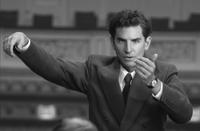Director and co-writer Bradley Cooper (A Star Is Born) is telling the true story of Leonard Bernstein, one of the most highly regarded music conductors and composers from the mid-20th century. Bernstein had many accolades and due to a technical exception, he would be considered an EGOT winner. Bernstein is notable because he was the music director for the New York Philharmonic in the 1960's, which is notable because his tenure was the first-time an American led that symphony orchestra in over a 100 years. He has done a ton of Classical music, both conducting and composing, but his true claim-to-fame is creating the music for the Broadway production of West Side Story (1957). Cooper gives us glimpses into Bernstein's career, but his film isn't really about Bernstein's process or how he does his work. There is some insinuation that his work takes precedent in his life above all else, but that doesn't feel like the real thrust of this narrative.
Cooper stars as Leonard Bernstein, nicknamed "Lenny," and the film follows him for about 30 years, centering on his relationship and marriage to his wife, Felicia Montealegre Cohn, played by Carey Mulligan (Promising Young Woman and An Education). She was a half-Costa Rican actress who met Lenny at a party given by her piano teacher. Lenny and Felicia would eventually have three children together. The two stayed with one another for the most part, despite the fact that Lenny was a gay man who had affairs with various men. Felicia isn't ignorant of this part of him. No one in his inner circle was really blind to it. It was practically an open secret and seeing Felicia navigate this open secret is the main thrust of this narrative.

There have been several films about closeted gay men who are entertainers, specifically ones in the music industry, who have to navigate relationships with women. Two of which include the recent Bohemian Rhapsody (2018) about Freddie Mercury and Rocketman (2019) about Elton John. Bohemian Rhapsody was probably the most standard or lackluster of the two in terms of the film-making techniques. Rocketman had its flourishes, which pushed it beyond being a straightforward drama and into what could be considered a jukebox musical. Obviously, Bernstein didn't create pop or rock songs that could form the basis of even the kind of musicals that Bernstein helped to craft on Broadway.
As a result, Cooper finds other ways to make his film stand-out, particularly when it comes to his film-making techniques. For starters, the first half of the film is presented in black-and-white. Cooper in fact shot the film on actual celluloid, 35 mm and frames it in what's known as the Academy ratio or 4:3. Cooper's narrative begins in the 1950's, so he's clearly trying to make the film feel like you're watching a production that was made in that decade. It's not uncommon. Alexander Payne did a similar thing for The Holdovers (2023), except Payne was aiming at the 70's.

The difference between what Payne did and what Cooper is doing here is Payne nailed the aesthetic of the time, but his goal wasn't simply to impress with flourishes or techniques to distinguish some prowess from behind-the-camera. However, Cooper is trying to impress. Cooper is trying to show that he's not only in front of the camera but he's behind it as well, directing with full creative control. In addition to the dialogue, which feels ripped out of screwball comedies of the 40's and 50's, Cooper employs long, continuous takes that are often static, again mimicking the style of the early and mid-20th century. The second half of Cooper's film reverts to color and wider aspect ratio, as the narrative jumps into the 70's and 80's. His style switches to mimic that time period. The long, continuous takes repeat but Cooper at times invokes overlapping dialogue, as if he were aping Robert Altman.
The stand-out sequence in that section is Cooper's performance of Bernstein conducting Mahler's Symphony No. 2 at Ely Cathedral. It's a bravura performance that immerses us in the moment and makes us feel the power of the music being played but also Lenny's passion as he's conducting. It outshines even what Cate Blanchett did in Tár (2022) in which she too played a conductor who performed Mahler. With his film-making flourishes, mixed with incorporating Bernstein's music, such as the "Prologue" to West Side Story and the bravura acting, it makes this film compelling to watch for sure. Yet, it's mostly superficial and doesn't provide as much insight into Bernstein's head as one might want.

It's comparable to FX's Fosse/Verdon (2019) where the spotlight is really on the musical genius' wife. In that series, Bob Fosse was the musical genius and Gwen Verdon was his spouse who lived in his shadow. That series obviously had more time to explore it, but we got more of a fully-fleshed out portrait of Gwen than we get of Felicia. Mulligan's performance is superb despite the lack of exploration of her character. She's given moments to shine throughout, which are helpful for sure, but we get less of her as a person outside Lenny's world than one might want. It's akin to what we got in Sofia Coppola's recent Priscilla (2023). Cooper's point might be the same as Coppola's, which is that the wife didn't have a person-hood that existed outside that of her husband's. Yet, a quick Internet search proves that wrong as Felicia was very much a political activist who fought for peace and criminal justice reform. Unfortunately, Cooper's film doesn't delve into any of that.
The focus is more on Felicia trying to navigate Lenny having various male homosexual companions. Cooper's film doesn't delve into those relationships with those companions. For example, Matt Bomer (The Normal Heart and Magic Mike) plays David Oppenheim, a clarinetist who was Lenny's lover before his marriage to Felicia. The film's beginning has Lenny and David in bed together. Yet, Bomer probably doesn't have more than a handful of lines. Sarah Silverman who plays Lenny's sister gets more lines of dialogue than Bomer. We don't get any kind of true conversations between the two. We have no sense of what David truly meant to Lenny beyond being a physical companion because there's a throwaway line about Bernstein not being able to be alone.

I don't really think the film does a good enough job of exploring why Felicia stayed with Lenny as long as she did, given that she knew for most of their marriage that he was a gay man. It could be the case that she just did what the times demanded. This is a fictionalized narrative, so more could have been done that veered from whatever reality to help us better understand her, but Cooper doesn't really do that either.
Rated R for language and drug use.
Running Time: 2 hrs. and 9 mins.
Available on Netflix.












